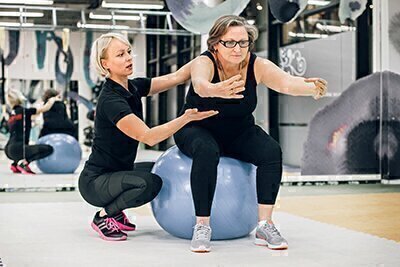Last updated February 2018
Whether your muffin top (or scale) overfloweth or you just want to build up your biceps, working out is a proven way to lose weight and improve your health. Our ratings of fitness centers and gyms will help you find facilities with equipment and potentially motivating classes or, if you don’t want to join the club, there are lots of less expensive alternatives, including government-run rec centers and exercise programs you can DIY or get help from a video.
 But some wannabe beach bodies need extra guidance and motivation to pick up a barbell or climb onto an elliptical machine—or make a plan and get instruction on how to carry it out. This is where a good personal trainer can help. So how do you find one of these muscle motivators without wasting a lot of time and spending too much money? Here are some tips to get you moving.
But some wannabe beach bodies need extra guidance and motivation to pick up a barbell or climb onto an elliptical machine—or make a plan and get instruction on how to carry it out. This is where a good personal trainer can help. So how do you find one of these muscle motivators without wasting a lot of time and spending too much money? Here are some tips to get you moving.
Looking for Mr. Good Abs
Start by checking the customer reviews here at Checkbook.org.
You can also talk to trainers on staff at top-rated fitness centers. The advantage of this is you can often try him or her out before committing to multiple sessions, whether by taking one Thursday-
night class or buying a single workout. Some gyms even offer a few free training sessions when you join. The disadvantages, of course, are that you’ll have to join a fitness club—where selection will be limited to on-staff trainers—and pay the club’s dues on top of a trainer’s fees.
Getting the Right Fit
Consider the kind of fitness pal you want. A drill sergeant to holler at you until you do 50 pushups? A cheerleader who motivates you to slog through that extra mile? Think back to favorite schoolteachers, consider which of their qualities you liked (strictness, humor), and look for a trainer with a similar personality. You’ll likely experience greater success with someone who inspires you to work hard.
Check Their Credentials
Ask trainers if they have bachelor’s or graduate degrees in physiology or related fields, how much experience they have, and whether they are certified. But even though in recent years the fitness industry has become increasingly professionalized, be aware that there are many certification programs, and some of them are meaningless.
Certification programs sponsored by the Aerobics and Fitness Association of America, American College of Sports Medicine, American Council on Exercise, The Cooper Institute, and the National Strength and Conditioning Association are among the most respected. Although certification through these programs may not ensure competence in every facet of exercise, most provide a good foundation for personal trainers.
You can judge trainers’ competence to some degree by talking to them and observing them in action. For example, ask weight-training instructors what kinds of activities—and what limitations—they recommend for reaching specific goals, and then ask why they recommend them. Evaluate the coherence of their answers. You can also, for instance, test out a yoga instructor by attending one session to see if he or she provides the kind of feedback you want.
Set Realistic Goals
 Starting a new fitness regimen is akin to quitting a bad habit—it takes a lot of dedication and you’re more likely to succeed if you set ambitious but realistic goals. A clear objective, of course, will also help your trainer set up a plan for you.
Starting a new fitness regimen is akin to quitting a bad habit—it takes a lot of dedication and you’re more likely to succeed if you set ambitious but realistic goals. A clear objective, of course, will also help your trainer set up a plan for you.
Timing Is Everything
How often—and for how long—you use a trainer depends on your budget, schedule, and motivation. For some clients, seeing a trainer once a week inspires them enough to work out on their own the rest of the time. Others hire a PT for a few weeks or months to reach a weight-loss goal, and still others (wealthy others) have a coach drop by their home gyms several times a week.
Where the Burpees Are
You can meet your trainer at the gym (a boon since it’s probably full of exercise equipment—but, again, you’ll have to join one) or at your home. Some trainers operate their own facilities. If you go with the convenient at-home option, you may need to invest in basic items like a weight bench or some tension bands, although many trainers offer boot camp-like classes that meet outside rain or shine.
What’s Your Type?
Some trainers are Jills-of-all-trades, able to coach you on a wide variety of exercises and equipment. Others are specialists in CrossFit, yoga, Pilates, or weightlifting. If you’re seeking a type of workout, ask candidates about their interests in that area.
What’s It Going to Cost?
Hiring a trainer is a luxury service for most people; expect to pay between $50 to over $150 per hour. There are a few ways to keep costs lower, though. Once you’ve found your Mr. or Ms. Right, ask if they’ll give you a discount for paying for a number of sessions upfront. (You can often save 10 percent or more over single-session prices.) And many trainers will let you sign up with a friend or two to split costs for small-group training sessions.
Avoid making a big upfront financial commitment. The entire fitness industry thrives on good intentions and counts on collecting money from consumers who quit before using up prepaid gym memberships, classes, and training sessions.

